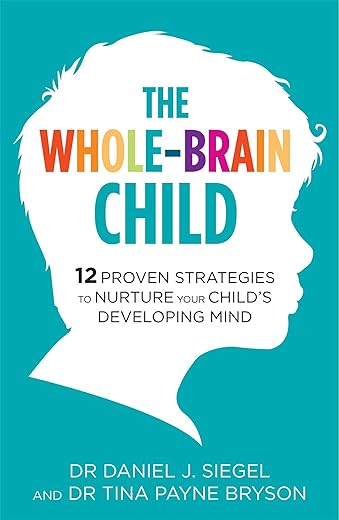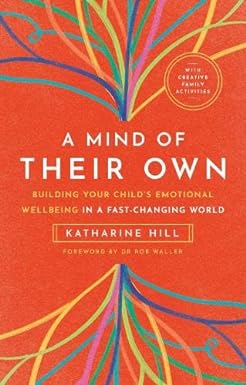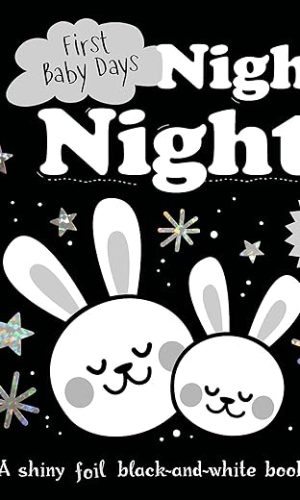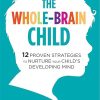The Whole-Brain Child: 12 Proven Strategies to Nurture Your Child’s Developing Mind
£10.10£14.20 (-29%)
In this pioneering, practical book for parents, neuroscientist Daniel J. Siegel and parenting expert Tina Payne Bryson explain the new science of how a child’s brain is wired and how it matures. Different parts of a child’s brain develop at different speeds and understanding these differences can help you turn any outburst, argument, or fear into a chance to integrate your child’s brain and raise calmer, happier children.
Featuring clear explanations, age-appropriate strategies and illustrations that will help you explain these concepts to your child, The Whole-Brain Child will help your children to lead balanced, meaningful, and connected lives using twelve key strategies, including:
Name It to Tame It: Corral raging right-brain behavior through left-brain storytelling, appealing to the left brain’s affinity for words and reasoning to calm emotional storms and bodily tension.
Engage, Don’t Enrage: Keep your child thinking and listening, instead of purely reacting.
Move It or Lose It: Use physical activities to shift your child’s emotional state.
Let the Clouds of Emotion Roll By: Guide your children when they are stuck on a negative emotion, and help them understand that feelings come and go.
SIFT: Help children pay attention to the Sensations, Images, Feelings, and Thoughts within them so that they can make better decisions and be more flexible.
Connect Through Conflict: Use discord to encourage empathy and greater social success.
Read more










by Reader S
A couple of thoughts:
– This book is not as bad as a 1-star but it certainly is not a 5-star one. I should have taken the 1-star review more seriously (the one that says this could have been a blog article). And, in view of that, I have decided to rate this book a 1-star also, just so people can have a more balanced view. The reality might have been a 2-star. But, would I recommend this book? No.
– This book is a example textbook for people who want to know how to extend 2-3 articles into a full-blown book with a) recount of stories to play out a scenario or example, b) repetition of a simple idea 2-3x everywhere, c) an amiable / long-winded style (or maybe the stories are just not very engaging to me… Malcolm Gladwell is engaging to me if you ask me…).
For example, repeat an example in the main content, repeat it in a conversation/story, and repeat it again in illustration.
“Hey, how did you like the Whole-brain child Book”?” Tom asked.
“I was kind of looking forward to it as a parent.” Answered Amy.
“You sound disappointed.” Tom asked.
“Yea, especially when the book came highly recommended on Amazon and it also seemed to be backed by science.” Amy explained.
“Oh, come on, it’s just a book.” Tom said.
“Hmm, the thing is… I might not have bought it or would have chosen another book if I knew it was that huge of an expectation gap.”
“So, you didn’t like the book because you feel it wasted you time.”
(I am just playing… but, I hope you get the idea).
– The book does have some scientific backing for 10-20% of the brain stuff. But, if you are expecting this book to tell you some of the latest scientific tips and tricks to raise a kid, then you will be very disappointed
– I would suggest readers start by reading the introduction, jump to the conclusion, and take a picture / some notes of the refrigerator list – that’s the 20% of content that contributed 80% of the book. And, if you enjoy reading a really repetitive book, then buy it.
On a more serious note, I do have some questions after reading this book:
1) Too much of the strategies in this book relies on caretakers to help their children a) to think, and not just feel, b) the structure of the brain (e.g., left, right, up, down, or the “wheel” of focus points), and c) the notion that there has to be parents who have to be whole to be able to raise a whole-brain child.
2) Too many sunny-days scenarios. It would have been nice to mention some of the pitfalls of common parenting tactics, like the use of rewards and disincentives (aka. “punishment”) and discuss them with research findings.
3) There are NO real life examples of who’s whole-brain, hence it makes me wonder why this strategy is a sound one. Yes, it’s important to be balanced physically and mental and as an individual as well as a community member.
I don’t know, maybe this book aims to be too “amiable”, whereas I’m trying to be analytical. But, I thought that’s what science should be – Critical and Empirical. No?
P.s., this book also reminded me of a “bad” / “amiable” writer I found on Fiverr, who likes to repeat the same thing at least 2-3 times with a paragraph… And, I thought that was undesirable. But, this book taught me that I should have been more understanding and patient but reject the order anyways…
by Taylor C. Rose
Having just had my first child, I am not exactly well-versed in the world of parenting books. In fact, this is the first one I read that wasn’t specifically about babies, so take my opinion for what it’s worth!
This book is full of practical advice, with the authors providing many example scenarios to demonstrate each point. As a result, it can feel a bit repetitive and even spoon-fed in places. However, I didn’t mind that as it does make for a very easy read.
My only slight negative about this book is that it is very light on the actual science upon which it is based. Indeed, it seems to be a trend in ‘science-based’ parenting books that the authors assume little to no scientific understanding on the part of the reader. While there are some descriptions about the different parts of the brain and thier roles, I would have appreciated more detail about what empirical research actually tells us about, for example, how memories are processed or how experience can influence integration between different parts of the brain.
In short, the content is written to be practical and accessible, possibly at the expense of providing detail on the neuroscience underpinning it.
by Nickie
My son bought this for me for Christmas – it’s a bedrock book- a must have on the shelf. Understanding children 101 – we can make the difference. This book is sound science, from the heart and easy to assimilate for busy moms ????
by V. Brummer
I have read several parenting books, mainly centred around respectful and gentle discipline strategies and parenting using logic and calm authority. This book covers the scientific why of those strategies. For me, having followed rie practices anyway, a lot of the suggestions I was already implementing. But I didn’t know, from a brain and developmental view, why they were important and why they worked.
This book offers the insight to go with respectful and gentle parenting. It explains why hugs, enpathy and calm acknowledgement works better than ignoring tantrums or any punitive punishment or time out strategy.
It is a lot to absorb in one read but does summarise at the end. And has quirky cartoons to demonstrate appropriate responses, very much like “how to talk so kids will listen” (another great parenting book).
I don’t think it’s enough on it’s own. They have another book covering discipline or try some of the other respectful parenting books to compliment this. But it’s a keeper. I’ve used the story re-telling strategy several times already with great insight into what was truly bothering my 3 year old.
Read this book if you practice rie or any other gentle parenting method. Read this book if you are tired of the constant time out and screaming matches. Read this book if you are a new parent looking for insight on your journey. Read this book.
by sarah
Must read for every parent